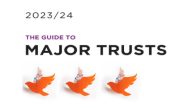Fundraising Friday - The Guide to Major Trusts: funders in focus
In the run-up to the new edition of The Guide to Major Trusts being published in September, we will be sharing some samples of the funders in the guide every #fundraisingfriday through August to give you an idea of what to expect. The guide contains 1,000 of the largest funders in the UK and provides deeper insight into the activities of the funders than our other publications.
The Edward Gostling Foundation
![]() Disability; social welfare; long-term illness
Disability; social welfare; long-term illness
Charity Commission no: 1068617
Correspondent: The Grants Team, Suite 1, 61 Thames Street, Windsor, Berkshire, SL4 1QW (tel: 01752 753900; email: info@theactfoundation.co.uk or use the contact form on the website)
Trustees: Michael Street; John O’Sullivan; Robert White; Denis Taylor; Christine Erwood; Russell Meadows; Colin Clarkson; Stephen O’Sullivan; Victoria Hoskins.
![]() www.edwardgostlingfoundation.org.uk
www.edwardgostlingfoundation.org.uk
General information
The Edward Gostling Foundation, formerly known as The ACT Foundation, was formed in 1994. According to its website, the foundation provides grants to UK-registered charities with the aim of ‘enhancing the quality of life of people in need and, particularly, those on a low income and who have a physical and/or mental disability or long-term illness’.
As detailed on its website, the foundation awards grants within four themes:
- Health and Wellbeing– supporting access to community facilities to maintain, improve and enhance general welfare
- Independent Living at Home– helping people to live independently in their own home for as long as possible
- Respite – enabling carers to take a break from the responsibility of caring for a loved one
- Transition – supporting people beyond education and into employment, long-term volunteering or other meaningful daytime activity, housing and independent living
Types of grant
The foundation offers small grants of up to £25,000 to charities with an annual income of £1 million or less that are in need of immediate support to sustain an essential existing service. Capital grants of up to £250,000 are available to charities of any size. Funding is directed towards projects that either enhance or expand an existing service or bring about a transformational change in the way support and care are provided.
Financial information:
| Year end | 31/03/2021 |
| Income | £4,060,000 |
| Assets | £104,950,000 |
| Grants to organisations | £3,750,000 |
Beneficiaries included: Tees Valley Community Foundation (£50,000); The Katherine Low Settlement (£25,000); Rainbow Trust Children’s Charity (£20,000); Halow Project (£10,000).
Exclusions
According to the foundation’s website, applications are not accepted from:
- Individuals
- Charities that have not been registered with a UK Charity Commission for at least 3 years
- Overseas projects or organisations
- Community Interest Companies
- Exempt Charities not directly regulated by a UK Charity Commission
- CASC’s or other sporting associations without a UK Charity Commission registration
- Social Enterprises without a UK Charity Commission registration
- Statutory organisations and charities that support them, including NHS hospitals or services, prisons and state funded or independent schools
- Organisations providing further education except where the facility is wholly for students with additional needs
- Community centres, youth clubs or other leisure activities, except where the main beneficiaries have a physical and/or a mental disability, are elderly or suffering from a long-term illness or are carers
- Campaigning, lobbying or other similar awareness raising campaigns
Applications
Small grants application forms can be downloaded from the foundation’s website. There is no application form for capital grants. Full information on what to include in an application and how to apply can be found on the foundation’s website.
Sources of information
Accounts; annual report; Charity Commission record; funder’s website.
Bally’s Foundation
![]() UK; Malta; Gibraltar; Sweden; Ukraine; Manilla; USA; Canada; Hong Kong
UK; Malta; Gibraltar; Sweden; Ukraine; Manilla; USA; Canada; Hong Kong
Charity Commission no: 1188099
Correspondent: The Trustees, 10 Piccadilly, London, WJ10 0DD (email: a contact is available on the foundation’s website)
Trustees: Christina Southall; Anita Iwugo; Kevin Hopgood; Neil Goulden; Holly Spiers.
General information
The Bally’s Foundation (formerly known as The Gamesys Foundation) was established in February 2020 by Gamesys Group which is now owned by Bally’s Corporation, a global casino and entertainment company. The foundation supports the well-being of individuals experiencing mental health conditions.
Grants are made to UK-based organisations with a minimum annual income of £50,000, or the equivalent for territories outside the UK. Funding is prioritised for countries where Gamesys plc either trades or has offices. These include the UK, Malta, Gibraltar, Sweden, Ukraine, Manilla, USA, Canada and Hong Kong.
Financial information
| Year end | 31/12/2020 |
| Income | £2,290,000 |
| Assets | £805,900 |
| Grants to organisations | £1,440,000 |
Beneficiaries
Women’s Aid (£843,000); Media Trust (£150,000); Sue Ryder and Red Cross (£100,000 each); Clubhouse Gibraltar (£26,300); Kinetic Foundation (£2,000).
Exclusions
According to the foundation’s eligibility document, it does not usually fund:
- Organisations dealing with physical health care, research, treatment and rehabilitation. For example, this includes areas such as cancer research and treatment, heart disease, dementia, epilepsy and so on.
- Applications relating to sports, such as sports scholarships, sponsorship or sporting events.
- Organisations or activities which preach or spread religious beliefs or attempt to convert people to their own belief or religious views.
- Organisations or activities which adopt a partisan political stance, or which are party political.
- Organisations that advocate the use of violence to campaign or influence public opinion.
- One-off conferences or workshops even within the mental health field, as it is difficult to demonstrate the impact that such events are likely to achieve. Funding can still be made available for conferences, workshops and other gatherings as long as they form part of longer-term projects.
- Appeals for the funding of study or the attainment of qualifications, whether by an individual or group sponsorship, or sporting events.
- Organisations or applications focused solely or primarily on raising public awareness of mental health issues via marketing campaigns. Funding can still be made available for such campaigns as part of a larger-scale project which will deal mainly with the alleviation, support and treatment of mental health.
- Services that fall under the government’s responsibility. Exceptions may be made in this case when specific services are not in place or are not available to the community. In these exceptional cases, low-cost alternatives can be used as an interim measure, along with setting a realistic plan of action for ensuring sustainability when the investment ends.
Applications
Apply via the foundation’s website.
Sources of information
Accounts; annual report; Charity Commission record; funder’s website.
Find out more about The Guide to Major Trusts 2023/24 here now and pre-order your copy today!



